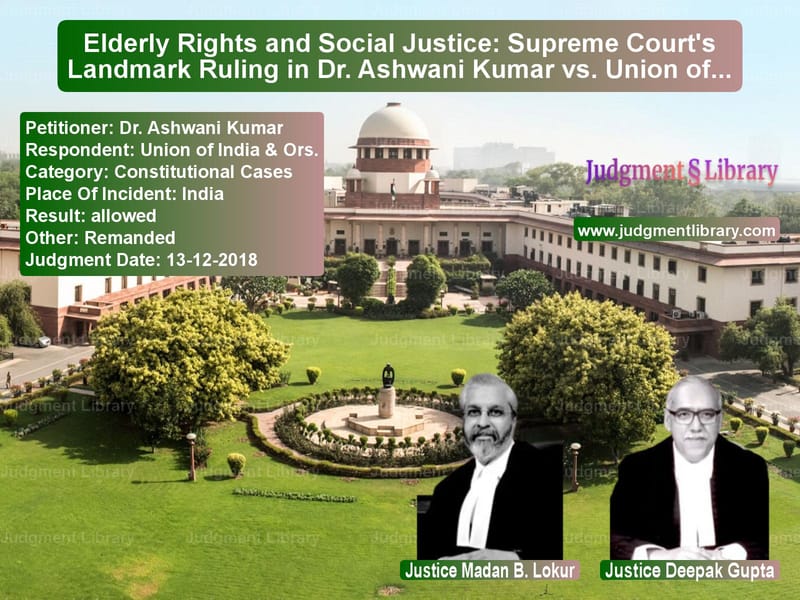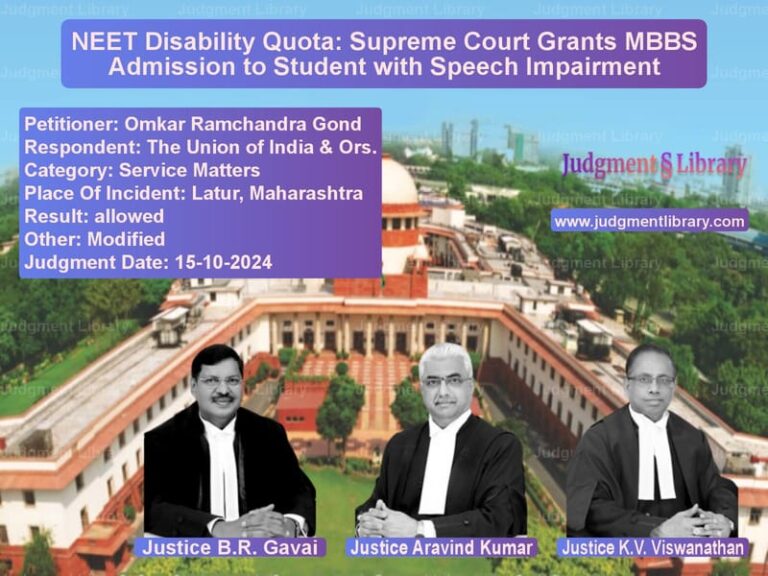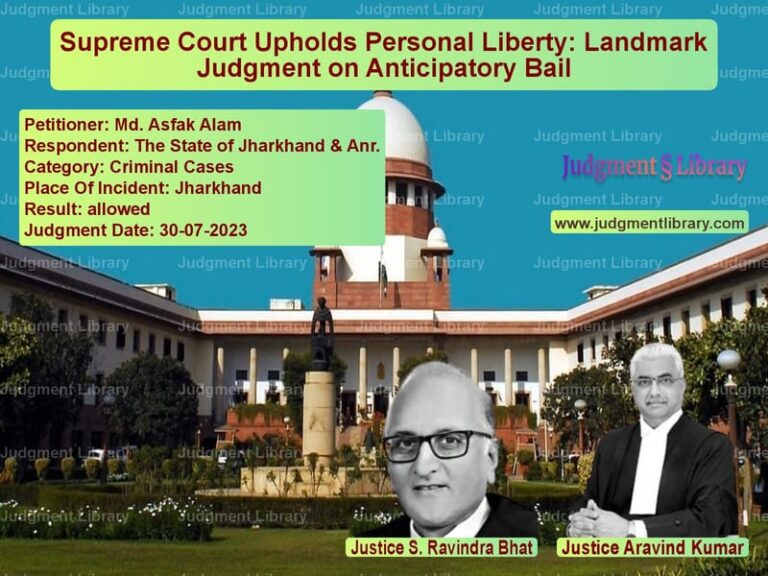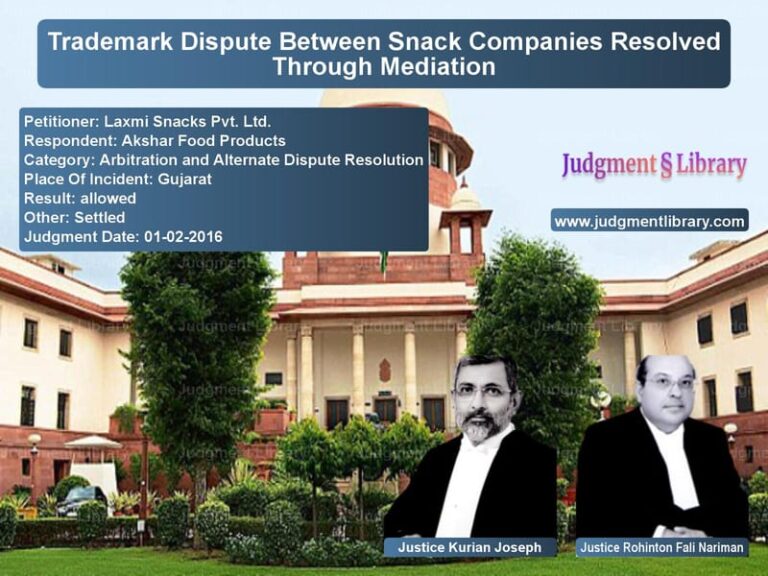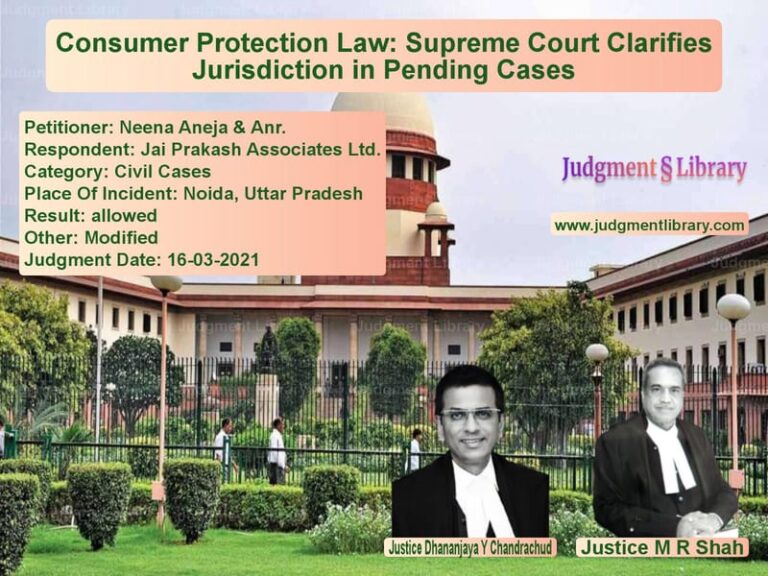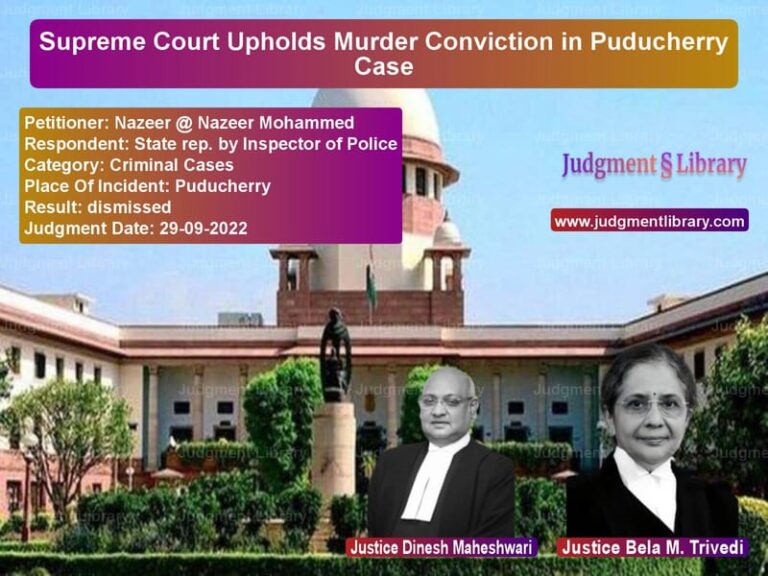Elderly Rights and Social Justice: Supreme Court’s Landmark Ruling in Dr. Ashwani Kumar vs. Union of India
The case of Dr. Ashwani Kumar vs. Union of India represents a significant moment in Indian jurisprudence, addressing the fundamental rights of elderly citizens. Filed as Writ Petition (C) No. 193 of 2016 under Article 32 of the Constitution, this case raised critical issues regarding social justice, dignity, and welfare of senior citizens.
In a judgment delivered by Madan B. Lokur and Deepak Gupta, the Supreme Court acknowledged that the rights of the elderly, particularly in areas of financial security, healthcare, and shelter, require urgent recognition and enforcement. The Court emphasized that these rights are an extension of the right to life under Article 21 of the Constitution.
Background of the Case
Dr. Ashwani Kumar, the petitioner, sought judicial intervention to ensure the implementation of social welfare policies for senior citizens. The petition was supported by social organizations such as HelpAge India, with notable contributions from legal and social activists.
Key Issues Raised in the Petition
- Implementation of an adequate pension system for the elderly.
- Provision of proper shelter and old-age homes.
- Availability of geriatric care and medical facilities.
- Effective execution of the Maintenance and Welfare of Parents and Senior Citizens Act, 2007 (MWP Act).
Arguments Presented
Petitioner’s Arguments
The petitioner emphasized that senior citizens have the right to live with dignity, which includes financial stability, healthcare, and housing. He argued:
“The right to live with dignity is, in effect, a part of the right to life as postulated in Article 21 of the Constitution.”
He further stated that the pension schemes provided by the government were inadequate, with some elderly citizens receiving as little as ₹200 per month, a sum that has remained unchanged since 2007. The petitioner argued that this amount was insufficient for survival and suggested linking pensions to the minimum wage.
Respondent’s Arguments
The Union of India, represented by the Additional Solicitor General, acknowledged the importance of elderly welfare but contended that financial constraints must be considered. The government emphasized the existing welfare schemes such as the Indira Gandhi National Old Age Pension Scheme and the National Programme for Healthcare of the Elderly.
However, the petitioner countered by highlighting the inefficiency and lack of uniformity in the implementation of these schemes across different states.
Supreme Court’s Observations
The Court delivered a historic verdict affirming the need for better protection of elderly rights. The judgment stated:
“While there has been some positive development in elderly care, attention has not been paid to their needs, requiring urgent intervention.”
The Court emphasized that social justice is a key constitutional principle, and protecting the elderly is an essential obligation of the State.
Final Judgment and Directions
The Supreme Court issued a set of directives to the Union of India and all state governments:
- Pension Reform: The government was instructed to review and revise pension amounts to ensure financial security for senior citizens.
- Shelter for the Elderly: Each district must establish at least one old-age home, with appropriate facilities, as mandated by the MWP Act.
- Geriatric Care: Hospitals must reserve beds for elderly patients and provide specialized medical care.
- Public Awareness: Governments were directed to launch awareness campaigns about elderly rights under the MWP Act.
- Regular Monitoring: The Union of India must submit periodic reports on the progress of these directives.
Conclusion
This judgment marks a crucial step towards ensuring dignity and security for India’s elderly population. By recognizing financial stability, healthcare, and shelter as fundamental rights, the Supreme Court has reinforced the principles of social justice enshrined in the Constitution.
Final Verdict: The Supreme Court issued a continuing mandamus, requiring ongoing monitoring of the implementation of elderly welfare schemes.
Petitioner Name: Dr. Ashwani Kumar.Respondent Name: Union of India & Ors..Judgment By: Justice Madan B. Lokur, Justice Deepak Gupta.Place Of Incident: India.Judgment Date: 13-12-2018.
Don’t miss out on the full details! Download the complete judgment in PDF format below and gain valuable insights instantly!
Download Judgment: Dr. Ashwani Kumar vs Union of India & Ors Supreme Court of India Judgment Dated 13-12-2018.pdf
Direct Downlaod Judgment: Direct downlaod this Judgment
See all petitions in Fundamental Rights
See all petitions in Public Interest Litigation
See all petitions in Legislative Powers
See all petitions in Judgment by Madan B. Lokur
See all petitions in Judgment by Deepak Gupta
See all petitions in allowed
See all petitions in Remanded
See all petitions in supreme court of India judgments December 2018
See all petitions in 2018 judgments
See all posts in Constitutional Cases Category
See all allowed petitions in Constitutional Cases Category
See all Dismissed petitions in Constitutional Cases Category
See all partially allowed petitions in Constitutional Cases Category

